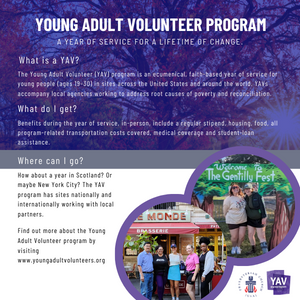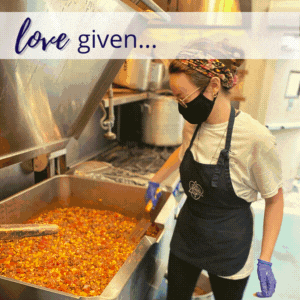By Linda Thompson, Catholic Volunteer Network Intern
In the beautiful terrain of Honduras, orphaned children have a nurturing place to call home at Farm of the Child, a Catholic non-profit organization and Catholic Volunteer Network member program, located in Trujillo and La Ceiba.
At Farm of the Child, the children’s spiritual, educational, social, and medical needs are met, and the goal is to help them become independent, productive, and responsible Christian adults. As one former missionary, Alisha Wilkinson (2009-2011), said, “Our lives at the Farm are not glamorous, and the changes may not be big. It is in the small, steady motions of everyday life that change takes place. Within this rhythm, our kids blossom and find the steady foothold that they need to take root and grow.”
Discerning the journey of missionary life at the Farm is essential before applying. An interested applicant is provided a Discernment Guide to read and reflect upon prior to the interview process. The Guide provides valuable information and insight about the four pillars, which are vitally important to missionary life at the Farm: service, community, spirituality, and simple living.
Kate Mattoon (2009-2012), a missionary says, “Each and every member of our group of missionaries has brought remarkable gifts to the table.”
The gifts applicants need to demonstrate are: a desire to serve others; an active faith life; a recognition of simplicity, that is, a desire to increase one’s understanding of solidarity with the poor; a commitment to participate in intentional community; a willingness to commit to the mission statement of the Farm of the Child, as expressed in the four pillars; and a sufficient amount of physical and mental health.
According to Andrea McMerty-Brummer, the Executive Director for Farm of the Child, USA, located in Jacksonville, Florida, “the most frequently identified aspect that applicants list as their motivation to serve at Farm of the Child is the faith-based community living component. Although it is the most challenging aspect of Farm life, it is also the most life giving.”
Each year the program accepts 8-10 missionaries who serve about 27 months (October 1-December 15). The total number of missionaries serving in the program at one time is 16-20. The application deadline is January 15, and telephone interviews are held the first two weeks in February. Applicants accepted into the program are notified by mid-March.
Prior to beginning service at the Farm, the selected candidates receive six to eight weeks of language training in Antigua, Guatemala. When they arrive at the Farm in Honduras, they receive two months of orientation, formation, and on-the-job training. Those two months overlap with the missionaries who are preparing to depart.
During the first two weeks of orientation, missionaries have an opportunity to explore all of the available roles: teacher, social worker, pastoral minister, accountant, adolescent home mentor, swim teacher, soccer coach, girl scout leader, liturgical team member, women’s group coordinator, etc. Missionaries who serve in these roles are not required to have formal training or education except for those who will serve in the medical clinic. The members of the medical clinic staff must have a medical or nursing degree.
At the end of the second week of orientation, missionaries list their top three job preferences. Placement in a position is based on a missionary’s skills and preferences and the Farm community’s need.
The missionaries are actively engaged not only in service to the children at the Farm but also to the children and residents in the surrounding communities. The missionary program at the Farm offers a range of community outreach services, including education, teacher training workshops, construction assistance, and sacramental catechesis. The orphanage maintains six family-style homes for a maximum of 50 children: the adolescent children live in La Ceiba where they attend a high school in the vicinity, learn about independent living, and receive vocational training; the younger children live in Trujillo, the main program location. Each year, the Farm serves 75 children through its elementary school and middle school and about 100-200 children through its medical clinic.
Summing up the influence missionaries have on the children, Executive Director, Andrea McMerty-Brummer, said, “The greatest impact that our missionaries and staff have on our children is teaching them that they are loved – loved by God and loved by each and every person who has cared for them at Farm of the Child.”
The founder of Farm of the Child, Vincent Pescatore, was a native of New Jersey and a graduate of Villanova University and the U.S. Naval Academy with a career as an auditor in the private sector in Washington, D.C. His life was transformed when he took an assignment, through Covenant House, at an orphanage in Guatemala, and there he met his wife, Zulena. Vincent Pescatore was a man with creative vision who lived the gospel of life and had compassion for orphans. His missionary experience and zeal inspired him to envision and lay the foundation for his first orphanage in Guatemala, and he was blessed to see the fruits of his labor. Although he passed away tragically and did not see his plans for the orphanage in Honduras become a reality, his wife and dedicated team of unwavering and benevolent supporters brought his plans to fruition. The orphanage celebrated fifteen years of dedicated service to the children last June.
Reflecting upon and highlighting her own experience at the Farm, the Program Director, Ysmary Trejo, said in their Fall 2010 newsletter, “….Upon exiting my front door, which is near the chapel, I see the children, their energy and their smiles, the house parents, the tias from each house, the volunteers, the Franciscan Sisters, and I am reaffirmed as to why I am here, to fulfill my own life’s mission.”


 Thousands of faith-based service opportunities can be at your fingertips with the RESPONSE. Download the latest edition today!
Thousands of faith-based service opportunities can be at your fingertips with the RESPONSE. Download the latest edition today!
